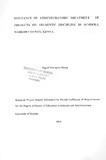| dc.description.abstract | Discipline is defined as the practice of training people to obey rules and orders and punishing them when they disobey the rules and orders. It is also the controlled behaviour or the situation that results from this training. In the laws of Kenya, school discipline is regulated in the Education Act L.N 40 of 1972 and L.N. 56 of 2001. These regulations are cited as school discipline and apply to public schools. Prefects, play a very important role in the management of discipline in schools. Their appointment should be democratic and cautiously done so as to ensure that the right cadre of prefects is appointed for effective administration.
The purpose of this study was to determine the influence of administrators' treatment of prefects on student discipline in secondary schools in Nairobi County. In particular, the study aimed to determine the extent to which methods used to select prefects influence student discipline in secondary school in Nairobi County, the extent to which information sharing by head teachers' with prefects influence students discipline, the extent to which the head teachers' provision of training for prefects influences student discipline, the extent to which the head teachers involve students' in decision making influence students' discipline and the extent to which the head teachers' use of school reward systems for prefects influence' school discipline in public secondary schools in Nairobi County. Research questions were formulated for each objective of the study.
According to the literature review, four processes influence participation in administration which includes: Information sharing is the communication which is concerned with keeping stakeholders informed about the status of the company. In the school the study investigated the channel of communication to the students through the prefects. Secondly training, raising the skill levels of employees and offering development opportunities that allow them to apply new skills to make effective decisions regarding the organization as a whole. In this study training given to prefects was investigated. Thirdly employee decision making, includes, determining work schedules, budgets or processes. The study sought to determine the extent to which prefects are involved in decision making. Fourthly rewards, tied to suggestions and ideas as well as performance. The study investigated the rewards and privileges accorded to prefects to motivate them to influence school discipline.
The sample size for this study was 300 students who were learning both in the national and provincial schools (both day and boarding) in Nairobi County, 272 students responded to the questionnaire translating to a response rate of 90.7 percent. Further, 57.65 percent of the sampled students were males while the rest were female. In addition, 52.6 percent of the sampled students were in Form Four and were followed by the students who were in Form Three who formed 45.8 percent of the total sample the rest were in Form Two. The data was collected using a structured closed questionnaire and the collected data was entered and analyzed in the Statistical Package for Social Sciences (SPSS). Both descriptive and regression model were used to analyze the data where the results of the study were presented in both tabular and graphical formats.
The results of the study showed that only information sharing and training which had a positive relationship with discipline among the sampled secondary schools with the student leadership, student participation in decision making, reward system all having an insignificant relationship with the school discipline. The study recommends that the school administration should consider taking the appointed prefects for a special training on leadership after their appointment. The study also recommends that head teachers that in addition to inviting motivational speakers, school libraries need to have books on character competencies.
The results from the study showed that a majority 80 percent of the sampled schools have adopted a democratic method of appointing the school prefects, who are given an open forum to campaign to be elected, which is the expectation of the Kenya Secondary Schools Student Council which a democratically constituted body. From the results of this study, it is recommended. that that a further research be undertaken to investigate if the students discipline is related in any way with their performance in secondary schools. In addition another research would be required to investigate if the student discipline is influenced in any way by external factors such as the family background where the student has been raised. | en_US |

